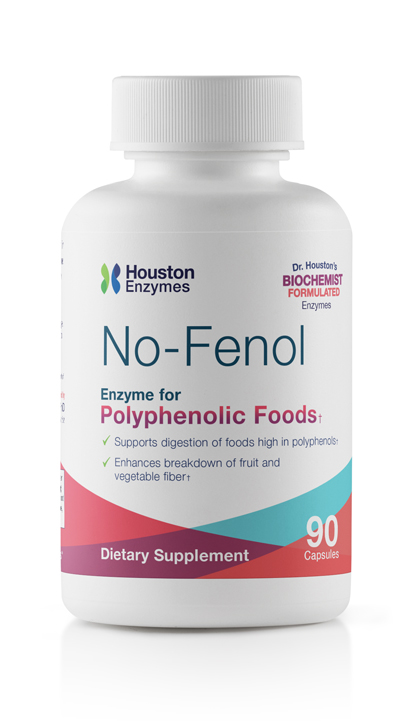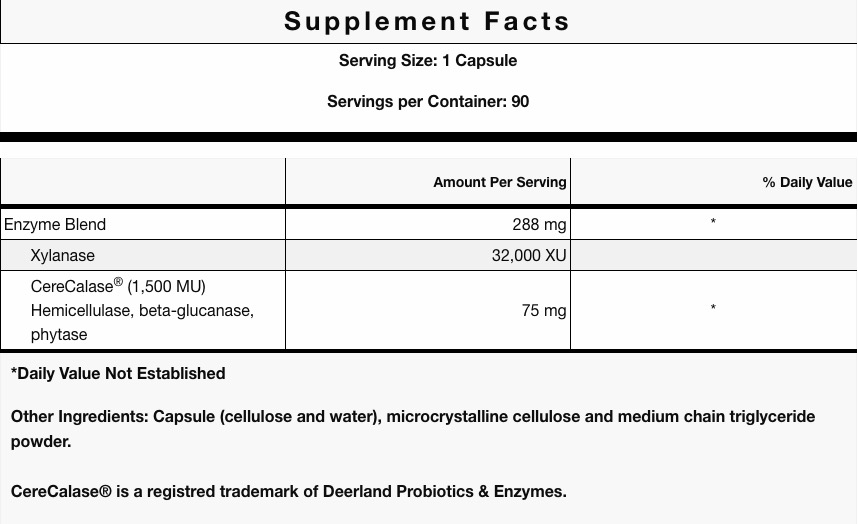No-Fenol
No-Fenol by Houston Enzymes was developed to help parents of children with diets affected by fruits and vegetables. No-Fenol helps with the digestion of these foods without the side effects that some children experience. Some children have a hard time digesting these phenolic compounds and can have symptoms, such as red ears and cheeks or dark circles under their eyes.
One of the major ingredients in No-Fenol is Xylanase which helps to break down the components of plant cell walls which are mainly carbohydrates. No-Fenol is available as a capsule or as a No-Fenol chewable tablet.



Why No-Fenol?
No-Fenol was created by Houston Enzymes to address the difficulties induced by weakened digestive capabilities. Many individuals suffer from intestinal irritability, poor nutrient uptake, inflammatory symptoms and general malaise as a result of poor enzymatic activity. It provides symptom relief by restoring adequate enzyme function. The exact mechanisms behind this efficacy are not yet known, but they are believed to stem from restored gut functionality.
When taking the capsules there is cellulose/medium chain triglyceride oil or MCT oil used as a filler. There is about 35 milligrams used. The oil comes coconut and the cellulose comes from European spruce trees. The capsule itself is made of cellulose to. There are 90 servings per container and 1 capsule is 1 serving.
Four different enzymes in No-Fenol.
Each of these catalytic molecules is designed to assist in the breakdown of their respective plant phenolics.
- Xylanase bolsters the hydrolysis of xylan carbohydrates.
- Hemicellulase digests hemicellulose fibers.
- Beta glucanase dissolves beta glucan starches.
- Phytase deactivates phytic acid.
A review of the proposed benefits of each enzyme can quickly establish No-Fenol as a capable interventionary treatment. Further, understanding the proper usage of No-Fenol prevents the recurrence of disease-related symptoms through an effective dose-response relationship.
Xylanase
Xylooligosaccharides, or XOS, are known for their beneficial effect on gut health, systemic inflammation and indigestion. However, many compromised individuals lack sufficient amounts of xylanase, an enzyme necessary for the digestion of XOS. This deficiency typically resolves into increased intestinal discomfort, poor nutrition and subsequent autoimmune disorders. Supplemental xylanase reverts the aforementioned symptoms and restores the capability to digest XOS.
Xylanase has been shown to:
- Reduce candida infections.
- Limit flatulence and bad breath.
- Possibly improve micronutrient uptake.
Hemicellulase
Plant cell walls retain their rigidity through the use of a complex, durable carbohydrate known as hemicellulose. Hemicellulose makes up a significant portion of the indigestible fiber present in modern diets. Hemicellulase allows the body to process hemicellulose into its constituent carbohydrate groups. This digestion extends into improved gut and overall health.
Hemicellulase supplementation results in:
- Decreased incidence of candida overgrowth.
- Bolstered nutrient uptake and physical performance.
- Improved enzymatic activity that would normally be reduced by advanced age.
Beta Glucanase
Much like hemicellulose, beta glucans are present in the cell walls of many plants, yeasts and fungi. This particular polysaccharide holds promising benefits with respect to insulin sensitivity, colon cancer and immune system function. These benefits can only be reaped when adequate amounts of beta glucanase are present in the gut. Reduced intestinal flora can result in poor beta glucan digestion, intestinal distress and disease.
Beta glucanase improves:
- Symptoms of candida.
- Immune system signaling.
- Colonic cell health.
Phytase
Phytic acid is one of the most potent “anti-nutrients” due to its deleterious effects on calcium, phosphorous, iron, zinc and magnesium absorption. These minerals bind to phytic acid in the gut and are rendered insoluble. Unfortunately, phytic acid is present in many plants and plant-based products, which limits the nutritive capacity of plant-based foods.
Phytase is responsible for breaking down already-bound phytate molecules into phytic acid and its previously-bound mineral. This process allows phytase to:
- Increase nutrient absorption.
- Elevate phosphorous content of plant products.
- Boost bone and teeth health.
Using No-Fenol
Each of the enzymatic substances in No-Fenol lack an upper-dosage limit. Nor do any of No-Fenol’s enzymes have a minimum recommended daily allowance. No-Fenol usage should complement the consumption of any plant or plant-based product, such as lettuce, bread or pasta. Any particularly large consumption of plant-based foods should be accompanied by a similar increase in No-Fenol dosage.
 No-Fenol contains the following ingredients:
No-Fenol contains the following ingredients:
- Enzyme Blend – 288 milligrams
- Xylanase – 32,000 XU
- CereCalase – 1,500 MU
- Hemicellulose, Beta-Glucanase and Phytase – 75 mg
No-Fenol is free of gluten, casein, soy, MSG, salicylates, sugar and artificial colors as well. There is no upper limit on taking enzyme supplements. However, studies have shown that large doses of enzymes do not cause toxicity or illness. 1/2 a capsule to 1 capsule with food can be taken. It does not have to be taken with each meal though for benefits to occur. It can be taken once or twice per day as necessary.

 No-Fenol contains the following ingredients:
No-Fenol contains the following ingredients: